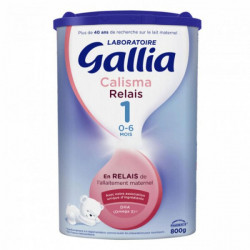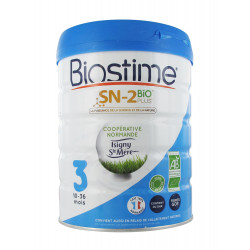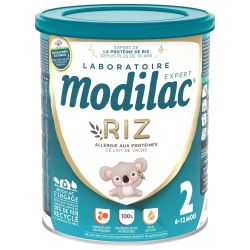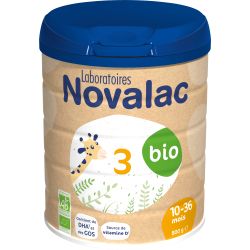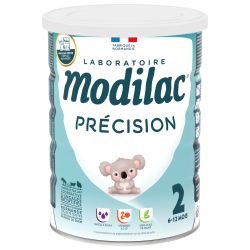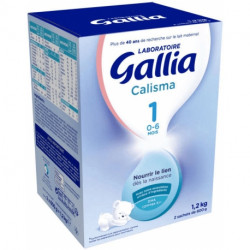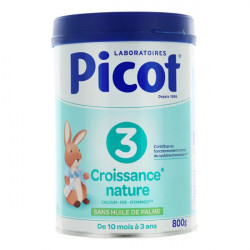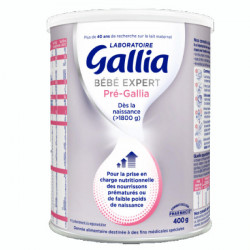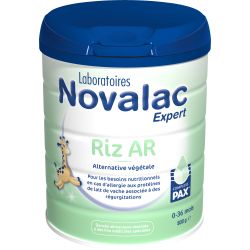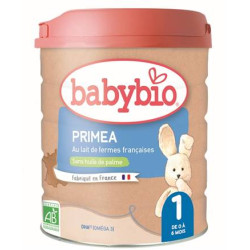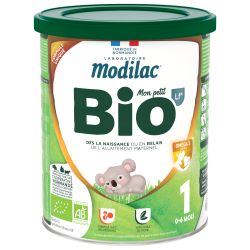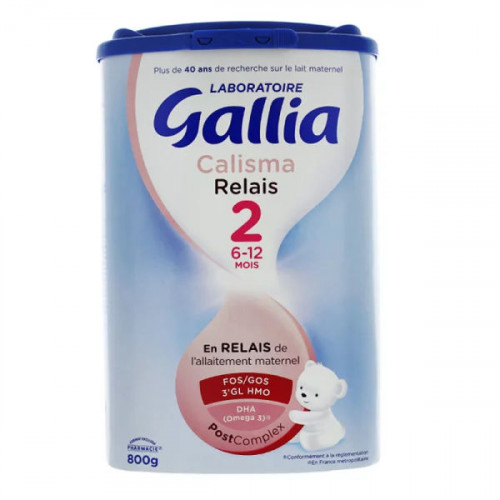



Gallia Calisma 2 follow-on milk meets the specific nutritional needs of your baby from 6 to 12 months, as a relay to breastfeeding and as part of a diversified diet. Indeed, even if your baby's diet has been diversified, he still needs milk. This milk must be designed to meet the baby's specific needs. This milk contains post-ferments derived from an exclusive fermentation process. Its galacto- and fructo- oligosaccharides (GOS and FOS) and its 3'GL HMO have a structure inspired by the oligosaccharides in breast milk.
With the consumption of this infant milk, it is possible that your child's stools may temporarily change in appearance...
Gallia Calisma 2 follow-on milk meets the specific nutritional needs of your baby from 6 to 12 months, as a relay to breastfeeding and as part of a diversified diet. Even if your baby's diet has been diversified, he still needs milk, which must be designed to meet his specific needs. This milk contains post-ferments derived from an exclusive fermentation process. Its galacto- and fructo- oligosaccharides (GOS and FOS) and its 3'GL HMO have a structure inspired by the oligosaccharides in breast milk.
With the consumption of this infant milk, your child's stools may temporarily change in appearance, but this is nothing to worry about.
Important notice:
Breast milk is the ideal, natural food for every infant. However, if you cannot or do not wish to breastfeed, Le Corps Médical will recommend an infant formula that meets your child's specific nutritional needs. This product cannot be used as a substitute for breast milk during the first 6 months of life. It is suitable for infants from 6 months of age as part of a diversified diet. Do not change your baby's diet without consulting your doctor. Your doctor can also advise you on the introduction of complementary foods.
Specific References
DIRECTIONS
It is important to follow the instructions below to avoid risks to your baby's health:
How do I prepare a bottle?
How much should I feed my baby?
The dosage and frequency of feeding are given as a guide only. The Medical Corps can adapt your baby's daily diet to suit his or her specific needs. Always use 1 scoop of powder in 30 ml of water.
| Baby's average weight (kg) | Child's age | Bottle preparation (1 scoop : 30 ml water) | Number of bottles per 24 h | Number of bottles per box | |
| Quantity of water (ml) to add | Number of scoops | ||||
| 7,2 à 9,6 | From 6 to 12 months | 210 | 7 | 3 then 2 | 24 |
lactose (MILK) - Vegetable oils (palm, copra, rapeseed, sunflower) - Skimmed milk (MILK) - Demineralized whey (MILK) - Galacto-oligosaccharides (MILK) - Whey concentrate (MILK) - Fructo-oligosaccharides - Fish oil (FISH) - Whey proteins (MILK) - Mortierella alpina - Choline chloride - Emulsifier : Soya lecithin (SOYA) - Taurine - Inositol - L-Tryptophan - L-Carnitine - Nucleotides - Antioxidant : fatty acid esters of ascorbic acid - Minerals (calcium and magnesium salts of orthophosphoric acid, potassium, sodium and magnesium chlorides, potassium and sodium citrates, calcium carbonate, iron, zinc, copper and manganese sulfates, potassium iodide, sodium selenite) - Vitamins (A, B1, B2, B3, B5, B6, B8, B9, B12, C, D3, E, K1).
| AVERAGE ANALYSIS | Per 100 g of powder | For 100 ml 14.43% rebuild | |
| Energy value | kJ | 1974 | 285 |
| kcal | 471 | 68 | |
| FATS of which | g | 22,2 | 3,2 |
| Saturated fatty acids | g | 9,9 | 1,4 |
| Linoleic acid (LA) | g | 3,01 | 0,428 |
| Alpha-linolenic acid (ALA) | g | 0,36 | 0,051 |
| Arachidonic acid (AA) | g | 0,06 | 0,008 |
| Docosahexaenoic acid (DHA) | g | 0,12 | 0,017 |
| GLUCIDS of which | g | 56,6 | 8,2 |
| Sugars of which | g | 55,8 | 8,1 |
| - Lactose | g | 54,0 | 7,8 |
| FOOD FIBRES of which | g | 4 | 0,6 |
| GOS (Galacto-oligosaccharides) | mg | 3500 | 480 |
| FOS (Fructo-oligosaccharides) | mg | 550 | 80 |
| 3'Galacto-syllactoses (3'GL) | g | 0,10 | 0,015 |
| PROTEINS | g | 9,4 | 1,4 |
| VITAMINS | |||
| Vitamin A | µg | 413 | 60 |
| % ERV | 103 | 15 | |
| Vitamin D3 | µg | 12 | 1,7 |
| % ERV | 171 | 24 | |
| Vitamin E | mg TE | 5,4 | 0,77 |
| Vitamin K1 | µg | 41 | 5,9 |
| Vitamin C | mg | 62 | 9 |
| % ERV | 138 | 20 | |
| Thiamine (B1) | mg | 0,35 | 0,05 |
| Riboflavin (B2) | mg | 0,97 | 0,14 |
| Niacin (B3) | mg | 3,2 | 0,46 |
| Pantothenic acid (B5) | mg | 3,42 | 0,49 |
*Reference value for the labeling of foods intended for infants and young children.
